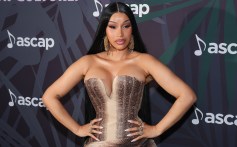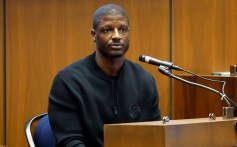Legal
Page: 8
Trending on Billboard
Halle Bailey and DDG have temporarily agreed to share custody of their son and drop domestic violence claims against each other, putting a halt to the musicians’ messy legal battle after months of back and forth.
Bailey and DDG (Darryl Dwayne Granberry Jr.) had been fighting in family court since this summer over custody of their nearly two-year-old child, Halo. The proceedings got ugly, with Bailey accusing the 28-year-old streamer and rapper of physical abuse and DDG claiming the 25-year-old singer and actress is mentally unstable.
Related
But the two artists have put their differences behind them, at least for now. A settlement docketed on Monday (Oct. 27) sets forth a temporary custody arrangement lasting for the next four months, and Bailey and DDG agree to mediate in “good faith” to reach a more permanent plan afterwards.
The settlement also sees both Halle and DDG dropping their competing requests for domestic violence restraining orders (DVROs) against each other. However, both sides reserve their rights to revive these allegations “upon a further incident of abuse.”
“Each party further agrees that should a future incident of abuse occur that postdates the dismissal of the instant DVRO requests, the fact that the parties dismissed her/his DVRO request shall not be prejudicial to the party seeking new orders,” reads the agreement. “The dismissal is for settlement purposes only and may not be used as evidence against the party(s) seeking new orders.”
Reps for Bailey and DDG did not immediately return requests for comment on Tuesday (Oct. 28). This is not surprising, as the settlement mandates that “the parties shall not publicly discuss the terms of this stipulation or the litigation between them.”
Related
Bailey and DDG dated between 2022 and 2024, and Halo was born at the end of 2023. Their court dispute began this past May, when Bailey filed a petition claiming DDG had physically attacked her multiple times in Halo’s presence. In one such instance, Bailey alleged that DDG pulled her hair, slammed her face on a car steering wheel and chipped her tooth.
DDG denied these claims and brought a counter-petition of his own in June, alleging that Bailey was actually the abusive one and had repeatedly threatened self-harm as a means of emotional manipulation. Bailey responded that she struggled with her mental health in the past but now has these issues under control.
Bailey was given court-ordered custody of Halo while the litigation played out. She’s retaining primary custody under Monday’s settlement agreement, while DDG gets the child twice a week and two weekends a month. They will split holidays.
The former couple agrees in the settlement not to post any photos or videos of Halo online. There are also a number of guardrails to govern their relationship; neither one is allowed to disparage the other in the child’s presence, they can only communicate via a special co-parenting app, and Halo should always be dropped off with the other parent at a public park.
“All exchanges shall be peaceful and polite, with the custodial parent handing the child to the non-custodial parent. (A polite hello and goodbye is acceptable),” reads the settlement.
Trending on Billboard
THE BIG STORY: Taylor Swift’s Eras Tour was so big that it has developed its own legal system.
With a record-shattering haul of more than $2 billion face-value ticket sales — and many times that in the secondary market — it’s not surprising that legal disputes have broken out. Don’t forget the old adage in the music industry: “If you write a hit, you get a writ.”
It started immediately after the chaotic pre-sale, when Swift fans filed class actions against Ticketmaster, accusing the company of causing the “disaster” rollout. In August, the Federal Trade Commission sued a ticket broker for allegedly using bots to buy thousands of Eras tickets that it resold for more than $1 million in profit. Just this month, an angry Swiftie sued StubHub for giving her “inferior” seats after she dropped $14,000 on Eras tickets.
Related
The latest fallout came last week in a criminal case — over a “cybercrime crew” that allegedly stole Eras tickets from StubHub and resold them for a windfall. For more, go read our full story here.
Other top stories this week…
BAND V. LABEL – Powerhouse regional Mexican label Rancho Humilde is locked in a bitter legal dispute with one of its fastest rising acts, the California-based band Fuerza Regida, with allegations of unpaid royalties, unapproved touring deals and “sabotage.”
DIDDY RELEASE DATE – Weeks after Sean “Diddy” Combs was sentenced to over four years in prison on prostitution convictions following a sweeping sexual abuse case, inmate records now show when he’s expected to be set free — but a lot could change before then.
MUNI LAWSUIT – Muni Long’s former managers, Chaka Zulu and Jeff Dixon, are suing the singer for allegedly refusing to pay more than $600,000 worth of promised fees; the Grammy-winning R&B star’s team calls the claims “unfounded.”
BEER BATTLE – Country singer Jameson Rodgers allegedly hurled a “full, unopened beer can” into a concert crowd and hit a fan in the face, resulting in “severe and permanent injuries.” Now, an appeals court says Sony Music can’t escape the ensuing lawsuit.
THE FIGHT GOES ON – Even after A$AP Rocky was acquitted on charges of shooting A$AP Relli on a Hollywood street, the former friends and collaborators continue to battle in a pair of civil lawsuits filed by Relli.
ANTITRUST CASE – Former Oak View Group chief Tim Leiweke, now facing federal bid-rigging charges, is asking a judge for permission to travel to Canada for business next month — a routine motion on paper that underscores how sharply life changes under indictment.
IMPERIAL MARCH – A Washington, D.C., man was allegedly detained after playing John Williams’ legendary “Imperial March” — aka Darth Vader’s music from Star Wars — to protest National Guard troops sent to the city by President Donald Trump, according to a new lawsuit filed by the ACLU.
SAMPLE SPAT – Lizzo is facing a copyright lawsuit over a track she teased on social media to poke fun at Sydney Sweeney’s American Eagle ad controversy, even though she never actually commercially released it.
Trending on Billboard
Powerhouse regional Mexican label Rancho Humilde is locked in a bitter legal dispute with one of its fastest rising acts, the California-based band Fuerza Regida.
Rancho Humilde filed a lawsuit in September accusing the band of breaching its record deal by unilaterally doing features for other artists and inking live performance contracts with Apple Music and Live Nation. Fuerza Regida countersued a month later, alleging the indie label withheld millions of dollars in royalties and tried to “sabotage” its success — including by leaving it off Latin Grammy Awards submissions.
Related
The dueling legal claims, moved from a California state courthouse to federal court on Oct. 20, reveal a stunning breakdown in the relationship between Fuerza Regida and its longtime label home. The fight comes just as Fuerza Regida’s star is on the rise; the band made history in May when 111XPANTIA debuted at No. 2 on the Billboard 200, making it the highest-charting Spanish-language album ever by a duo or group.
Fuerza Regida, a quintet of regional Mexican hitmakers from San Bernardino, signed with Jimmy Humilde’s label in 2018. The band now puts out music via a joint venture between Rancho Humilde and its own Street Mob Records, with distribution by Sony Music Latin.
Rancho Humilde’s lawsuit is focused on exclusivity language in the label’s original record deal with Fuerza Regida, which allegedly entitled the label to a seat at the table and a cut of proceeds for all recording and touring contracts. According to Rancho Humilde, Fuerza Regida violated this deal by performing unauthorized features for other artists and not sharing the royalties.
The lawsuit lists 27 offending songs, including “Qué Onda,” Fuerza Regida’s Billboard Hot 100 entry from 2023 with Calle 24 and Chino Pacas, and “Modo Capone,” the band’s 2024 collaboration with Pacas and Drake that hit No. 11 on Billboard‘s Hot Latin Songs chart.
Related
Rancho Humilde says Fuerza Regida also disregarded exclusivity by contracting directly with Apple Music this past summer for a live concert taping in Mexico City, as well as with Live Nation for U.S. tours in 2023 and 2024.
“[Rancho Humilde] has suffered damages, including, but not limited to, lost royalties, advances, fees, market-share and other compensation that should have been directed to Sony and accounted to [Rancho Humilde], lost shares of touring revenues [and] lost income from unauthorized deals such as the Apple agreement,” says the lawsuit. “The exact amount of damages is subject to proof at trial but exceeds $15 million.”
Fuerza Regida, however, tells a very different story in its countersuit. The band claims Rancho Humilde is actually the one who has breached their record deal by failing to pay millions of dollars in royalties and stonewalling audit requests.
The countersuit also says Rancho Humilde has engaged in “systematic financial malfeasance” by refusing to revert master recordings back to the band as required by the record deal, as well as by using “clandestine arrangements” with Live Nation to siphon off touring profits.
Related
“In addition to its fraudulent schemes and systematic contract breaches, Rancho and its principal Jimmy Humilde escalated to a malicious campaign of active sabotage designed to destroy [Fuerza Regida’s] professional relationships and career opportunities within the entertainment industry,” reads the countersuit.
Fuerza Regida says that as part of this campaign of “sabotage,” Rancho Humilde requested that Sony remove the band from Latin Grammy Awards submissions in 2024, even though they had been a top-selling act that year.
Additionally, the countersuit claims Jimmy Humilde sent “threatening and intimidating text messages” to Apple’s head of Latin music in an attempt to “derail” Fuerza Regida’s live concert taping. Overall, Fuerza Regida is seeking at least $25 million in damages from the label.
In a statement to Billboard on Monday (Oct. 27), the band’s attorney Kenneth D. Freundlich says, “Rancho Humilde and Jimmy Humilde have for years engaged in brazen self-dealing, enriching itself at the expense of our client Fuerza Regida.”
Related
“Rancho’s bad faith state court lawsuit against Fuerza was the last straw,” adds Freundlich. “After our removal, the disputes will air in federal court where Rancho must now respond to our detailed claims of wrongdoing.”
Reps for Rancho Humilde did not return a request for comment.
The Fuerza Regida fight is not Rancho Humilde’s only ongoing legal battle with top talent. Regional Mexican artist Codiciado, who was signed to Rancho Humilde as part of the ensemble Grupo Codiciado but has since parted ways and gone solo, sued the label in June, alleging it infringed his intellectual property by getting the rest of the band back together with a new act called Los Codicia2. Rancho Humilde has not yet responded to Codiciado’s claims.
Trending on Billboard
Weeks after Sean “Diddy” Combs was sentenced to over four years in prison on prostitution convictions following a sweeping sexual abuse case, inmate records posted by the federal Bureau of Prisons show that Diddy, 55, is now expected to be set free on May 8, 2028.
Combs had already been expected to serve less than the full sentence, thanks to roughly a year of time-served as he sat in jail awaiting his trial and verdict. But the newly-revealed release date would represent an even-earlier release than previously thought — only roughly two years and seven months after his date of sentencing.
Such dates are just estimates, reflecting the “inmate’s projected release date based on BOP calculations.” The earlier-than-expected date could reflect that Combs will serve the final few months of his sentence at a residential reentry center, or halfway house, or his participation in BOP’s drug abuse rehab program, which can sometimes shave months off an inmate’s sentence.
Related
Reps for Combs did not immediately return a request for comment. Reps for the federal Bureau of Prisons were unavailable for comment, citing the government shutdown.
Once one of the music industry’s most powerful figures, Combs was arrested and charged in September 2024 with racketeering (RICO) and sex trafficking violations. Prosecutors said he ran a sprawling criminal operation aimed at facilitating “freak-offs” — elaborate events which he allegedly forced ex-girlfriend Cassie Ventura and other women to have sex with male escorts while he watched and masturbated.
Following a blockbuster trial this spring, jurors issued a verdict clearing Combs on the RICO and sex trafficking charges that could have seen him sentenced to prison for life. But he was still convicted on two lesser counts for transporting Ventura and others across state lines for the purposes of prostitution.
At a sentencing hearing earlier this month, Judge Arun Subramanian sentenced him to 50 months in prison on those convictions. That was far less than the 11 years sought by prosecutors, but well more than the 14 months his lawyers had asked for. Counting his year of time-served credit, that sentence would seemingly have seen the star released at some point in September or October 2028.
Regardless of BOP estimates, Diddy’s release date could change dramatically if he wins his appeal, which he launched last week at the U.S. Court of Appeals for the Second Circuit. His lawyers will challenge not only the length of his sentence, but also his underlying convictions themselves.
If such arguments are successful – read what Diddy’s lawyers might argue here – he could get out even earlier than May 2028. But the appeals process is often slow, and Combs will likely serve a sizeable chunk of his prison term before the case is even decided.
That is, unless he’s pardoned or commuted by President Donald Trump – the other big factor could significantly change his release timeline. Though Trump confirmed that Diddy’s team reached out to the administration about such an edict, the White House has publicly denied that it is considering clemency for the convicted mogul.
Trending on Billboard
A Jamaican man who allegedly stole and resold more 900 tickets to Taylor Swift‘s Eras Tour has pleaded guilty to a New York criminal charge.
Tyrone Rose, 20, was arrested in March over allegations that he used backdoor access as an employee of a StubHub contractor to steal the pricey tickets, before forwarding them to a Queens-based accomplice who resold them for more than $635,000 in illegal profit.
Related
At a court hearing Thursday (Oct. 23), Rose pleaded guilty to a single count of grand larceny in the second degree over the alleged scalping scheme, while a sentencing hearing on that charge was set for January. Rose could face up to 15 years in prison.
The guilty plea was likely part of a deal under which prosecutors could recommend less than the maximum. Rose was also charged with five additional counts, including computer tampering, money laundering and conspiracy, which were not included in Thursday’s guilty plea.
Swift’s Eras Tour wrapped up last year with a record-breaking haul of more than $2 billion in face-value ticket sales over a two-year run that featured 149 stops in 51 cities across 21 countries. Massive demand for tickets led to a chaotic presale in November 2022, sparking calls for ticketing reform; it also created an infamously pricey secondary market, with even basic seats selling for thousands.
Related
The Eras Tour has also been big business in the courtroom. Swift fans filed class actions against Ticketmaster over the presale, and the Federal Trade Commission is suing a ticket broker for allegedly using bots to buy tickets that it resold for more than $1 million in profit. Just this month, an angry Swiftie sued StubHub for giving her “inferior” seats after she dropped $14,000 on Eras tickets.
In March, Queens prosecutors charged Rose with stealing more than 900 Eras tickets while working at a StubHub contractor in Jamaica called Sutherland. He allegedly abused his position to access a restricted area of StubHub’s network that houses URLs for event tickets that have already been sold, then re-directed them to New York-based co-conspirators who resold them for a windfall.
“These defendants tried to use the popularity of Taylor Swift’s concert tour and other high-profile events to profit at the [expense] of others,” Queens District Attorney Melinda Katz said at the time. “They allegedly exploited a loophole through an offshore ticket vendor to steal tickets to the biggest concert tour of the last decade and then resold those seats for an extraordinary profit.”
Related
StubHub was not accused of any wrongdoing. When Rose was arrested, the company said it had promptly reported the scheme to both Sutherland and to law enforcement when uncovered, and had replaced or refunded all affected orders. Sutherland was also not accused of any wrongdoing.
Both an attorney for Rose and a spokesperson for the Queens DA did not return requests for comment on the guilty plea on Friday (Oct. 24).

Trending on Billboard
Muni Long’s former managers are suing the singer for refusing to pay more than $600,000 worth of promised fees, though the Grammy-winning R&B star’s team calls the claims “unfounded.”
Long (Priscilla Renea Hamilton) is facing breach of contract claims from Ebony Son Entertainment, the Atlanta-based management company run by Chaka Zulu and Jeff Dixon. The duo is best known for managing Ludacris, with whom they started the record label Disturbing Tha Peace in 1998.
Related
Ebony Son claims in a Thursday (Oct. 23) federal court complaint that Zulu and Dixon’s hard work was instrumental to Long’s success, including her win for Best R&B Performance at the Grammy Awards this year. But Long fired her managers in January and now owes hefty commissions from live shows and recording and writing gigs, according to the complaint.
“Defendant Priscilla Renea Hamilton is publicly known as the musical artist ‘Muni Long’ but her less well-known performances are as a serial grifter,” reads the lawsuit. “After taking the benefit of plaintiff’s elite and highly sought-after management services for more than a year, Muni Long shamelessly reneged on her promises to pay plaintiff the agreed-upon, customary percentage of revenue she earned, and only earned because plaintiff assisted in obtaining those engagements.”
Long’s team denies the claims as “unfounded” in a statement to Billboard on Friday (Oct. 24). The team says it’s “deeply unfortunate that the matter could not be resolved privately and professionally,” claiming Long made “good faith” settlement offers even though “no formal contract ever existed” with Ebony Son.
Related
“The situation has been particularly distressing, as it involves the same team that took possession of the artist’s phone and sought to have her involuntarily committed to a mental health facility, despite medical confirmation that she was suffering from a Lupus flare-up,” says Long’s team in the statement. “All appropriate avenues are being pursued to ensure that the truth is fully and fairly defended. The artist hopes this underscores the importance to all those in creative fields to safeguard their personal and professional boundaries and be discerning about those they trust to represent them.”
Zulu and Dixon have been battling with Long in court since July, when the managers first leveled allegations over the unpaid commissions in a California state court complaint. That state court case was withdrawn just days before Ebony Son took the claims to federal court.
Long broke onto the R&B scene in 2022 with her hit single “Hrs and Hrs,” which spent 20 weeks on the Billboard Hot 100 and peaked at No. 16 on the chart. She signed with Def Jam Recordings that year, and “Hrs and Hrs” won the Grammy for Best R&B Performance at the 2023 ceremony.
Related
According to Thursday’s lawsuit, Long had her first meeting with Zulu and Dixon at New Orleans’ ESSENCE Festival of Culture in July 2023. During this meeting, the managers say, Long allegedly agreed to pay the duo 20% of all her gross revenue and reimburse all management-related expenses.
Zulu and Dixon say they began putting in work for Long “within days of being hired,” ensuring that her 2024 album Revenge was released before the Grammys cutoff date. This made it possible for Long to win another Best R&B Performance Grammy that year for her song “Made for Me,” the lawsuit claims.
The managers allege Long paid her required commissions and reimbursements for over a year, but that she “purportedly became unhappy” with the amount of the fees and ultimately stopped all payments in October 2024. In January, they say she officially cut ties with Ebony Son.
“Plaintiff, who worked tirelessly to advance Muni Long’s career, [has] secured over $5 million in revenue for defendants to date,” says the complaint. “But as to a significant percentage of this revenue, defendants have failed to pay plaintiff the corresponding commission payments as required by the agreement.”
Related
Zulu and Dixon claim Long owes more than $600,000 worth of commissions and expenses from the money she made via live shows, a $1 million ASCAP publishing deal, songwriting agreements with Shenseea and Tiwa Savage, and features on tracks by Teddy Swims and Toosi.
The lawsuit says Long also owes fees on other sources of revenue that Zulu and Dixon have not yet been able to fully audit, including the money she made opening for Chris Brown on the 11:11 Tour in 2024.
Unrelatedly, Zulu was criminally charged with murder in 2022 for shooting a man during an altercation in Atlanta. The charges were later dropped after prosecutors determined that Zulu was acting in self-defense.
Trending on Billboard
The legal battle between A$AP Relli and A$AP Rocky is continuing on despite Rocky’s acquittal on charges of shooting his former friend and associate this past February.
On Thursday (Oct. 23), a judge in Los Angeles refused to throw out the civil defamation lawsuit brought by Relli (Terrell Ephron) stemming from the alleged altercation with Rocky (Rakim Mayers) near a Hollywood hotel in 2021.
Related
Relli alleges that Rocky fired a handgun at him twice during their argument, while Rocky maintains that the “weapon” was a prop gun filled with blanks. Prosecutors charged Rocky with two felony assault counts in 2022, but he was acquitted of both criminal charges following a sensational trial this year.
Still, Relli is continuing to claim that Rocky shot him in a civil lawsuit that he brought around the same time as his former A$AP Mob collaborator’s arrest. That case, in which Relli seeks financial damages from Rocky for assault, battery and emotional distress, is scheduled to go to trial in January.
Relli separately brought a defamation lawsuit in 2023 against both Rocky and his criminal defense lawyer, Joe Tacopina. Relli says the duo smeared his name when Tacopina gave press interviews calling Relli’s shooting claims “extortion” and a “get-rich-quick-scheme.”
Rocky and Tacopina sought to get the defamation suit thrown out under California’s anti-SLAPP statute, which guards against frivolous litigation that threatens free speech. But Judge Randolph M. Hammock ruled Thursday that Relli’s slander claims don’t meet this standard for dismissal.
Related
Judge Hammock said Rocky and Tacopina cannot rely on a principle known as the litigation privilege, which provides a complete free speech shield for statements made in court proceedings, because the lawyer’s media interviews were given “to shape the public opinion” rather than advance any legal position. The judge also determined that Relli’s defamation claim is not “meritless” under the anti-SLAPP guardrails.
“For purposes of this motion, plaintiff has established all elements of his defamation claims,” wrote the judge. “Plaintiff submits evidence that Tacopina published statements to media outlets, in essence contending that plaintiff fabricated the incident with Mayers then filed the lawsuit to force a payout.”
“Plaintiff refutes this in his declaration, as he attests that Mayers fired a handgun and struck him in the hand,” continues Judge Hammock’s decision. “He establishes that Tacopina’s statements were defamatory, as they labeled Ephron a liar and extortionist. Finally, Ephron established that these statements caused him damages. For purposes of this motion, plaintiff has met his burden.”
Relli has not actually won on any defamation claims yet, but the lawsuit moved past a major obstacle in Thursday’s ruling. Now, the matter will continue forward through evidence discovery and toward a possible trial.
Relli’s lawyers declined to comment on Thursday. Reps for Rocky and Tacopina did not immediately return requests for comment.

Trending on Billboard
A Washington, D.C., man who was detained after playing the Evil Empire music from Star Wars to protest National Guard troops is suing the government for violating his constitutional rights.
In a lawsuit filed Thursday (Oct. 23), Sam O’Hara claims that he was wrongfully handcuffed and detained for playing “The Imperial March” — John Williams’ iconic villain music from the sci-fi franchise — as he recorded videos of the troops that he later posted to TikTok.
Related
The case, filed by the American Civil Liberties Union (ACLU), claims the brief detention violated O’Hara’s right to peacefully protest under the U.S. Constitution’s First Amendment.
“The law might have tolerated government conduct of this sort a long time ago in a galaxy far, far away,” the ACLU wrote, playing on the famed opening text from Star Wars. “But in the here and now, the First Amendment bars government officials from shutting down peaceful protests.”
“The Imperial March (Darth Vader’s Theme),” written by Williams, first appeared in The Empire Strikes Back, the 1980 sequel to the original Star Wars. The famed composer’s score for the film reached the No. 4 spot on the Billboard 200 in July 1980, eventually spending 28 weeks on the chart.
“In the Star Wars franchise, The Imperial March is the music that plays when Darth Vader or other dark forces enter a scene or succeed in their dastardly plans,” O’Hara’s lawyers write. “It is also the soundtrack of Sam O’Hara’s protest against the National Guard deployment in D.C.”
Related
President Donald Trump declared a “crime emergency” in Washington, D.C., in August and ordered the takeover of law enforcement in the city, with National Guard troops arriving in the capital shortly thereafter. The move, along with other military deployments to American cities, has been deeply controversial and led to widespread protests.
O’Hara, who was “deeply concerned about the normalization of troops patrolling D.C. neighborhoods,” began protesting their presence in his city by walking behind them as they marched through the streets — and by playing a score recognized globally as a theme for tyranny.
“Using his phone and sometimes a small speaker, he played The Imperial March as he walked, keeping the music at a volume that was audible but not blaring,” the ACLU’s lawyers write. “Mr. O’Hara recorded the encounters and posted the videos on his TikTok account, where millions of people have viewed them.”
Related
According to O’Hara, most National Guardsmen “ignored Mr. O’Hara, and a few smiled or laughed,” but one was “not amused by this satire.” The trooper, Sgt. Devon Beck, allegedly turned around and threatened to call in local police to “handle” him if he kept playing the song. When O’Hara kept going, he says Metropolitan Police Department officers quickly arrived and put him in cuffs, shutting down his protest.
O’Hara says the cuffs were placed so tightly that they left marks on his wrists, and were not loosened after he complained. He also says his detention was “needlessly” prolonged before he was eventually released 15 to 20 minutes later.
In technical terms, the lawsuit names Beck, four D.C. police officers, and the D.C. District Attorney as defendants. It accuses them of violating both the First Amendment and the Fourth Amendment, which guards against unreasonable searches and seizures.
Trending on Billboard Finesse2Tymes has spoken out about his Monday (Oct. 20) arrest on drug charges, and said the situation has caused him to experience a lot of growth. The Memphis rapper was released from the Harrison County Jail in Texas on Tuesday (Oct. 21), according to local Fox affiliate Fox13, and hopped on Instagram […]
Trending on Billboard
Country singer Jameson Rodgers allegedly hurled a “full, unopened beer can” into a concert crowd and hit a fan during a 2022 festival on the Jersey Shore – and an appeals court now says Sony Music must continue to face the resulting lawsuit filed by the injured woman.
Samantha Haws sued Rodgers, Sony and others, claiming the incident at the 2022 Barefoot Country Music Festival in Wildwood, NJ, had left her with “severe and permanent injuries.” She even sued MillerCoors because it was a can of Miller Lite that Rodgers allegedly threw.
Related
Sony wants to be dismissed from the case, arguing that it cannot be sued in New Jersey because it isn’t based in the state and didn’t operate the festival. But a lower judge denied that request last year – and a New Jersey appeals court upheld that ruling on Wednesday.
In recent years, there’s been a disturbing trend of objects being thrown at concert performers. NBA YoungBoy stopped a show earlier this month after fans threw objects, Luke Combs was hit in the face during a July concert, and Bebe Rexha needed stitches after being hit with a smartphone, leading to criminal charges against the offender.
But there’s also been multiple incidents involving objects thrown by the artists, often resulting in legal action. 50 Cent was sued last year over an incident in which he threw a microphone off-stage in frustration, allegedly hitting a stagehand. Cardi B hurled a mic at a fan who threw a drink at her at a 2023 Las Vegas concert, resulting in another lawsuit.
In her July 2024 case, Haws claims that Rodgers and/or others “threw full, unopened cans of Miller Lite beer from the stage into the crowded audience” at the Barefoot Festival. She says one struck her “violently and without warning in the head and facial area,” leaving her with “severe, painful and permanent bodily injuries.”
Sony, named as a defendant in the case because Rodgers is signed to Columbia Nashville, immediately moved to exit the case. The company argued that it didn’t organize or market the festival or pay for or provide security for it. But a judge said last year that Rodgers had potentially performed at the festival as Sony’s agent, which could legally put the company on the hook for his actions.
In Wednesday’s decision, the New Jersey appeals court rejected Sony’s appeal of that ruling. It said there was “no error” by the lower judge because Haws had established a “business relationship between Sony and Rodgers related to live performances” and the label “would be subject to specific jurisdiction if Rodgers was acting on Sony’s behalf at the time Haws was injured.”
The ruling does not mean Sony is liable to Haws, or that her allegations will ultimately be proven. Instead, it merely sets the stage for more litigation over whether Sony was sufficiently involved to face the lawsuit. Reps for Sony, and both reps and an attorney for Rodgers did not immediately return requests for comment on Thursday.

 State Champ Radio
State Champ Radio 








